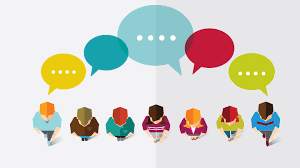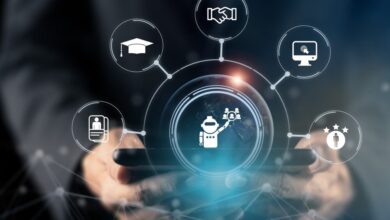
The education system has got to be one of the most exciting areas for the application of AI. With its ability to automate many admin-based tasks, generate a wealth of widely-sourced information in seconds, and engage in human-like interactions, AI has already benefited the education system by reducing the heavy workload of teachers and providing new learning tools for students.
Yet, as with healthcare and other public sector industries, the many potential benefits to be reaped from AI’s use in the education sector comes with a flip side: risk.
Concerns over the risk of AI in education
The education of upcoming generations is a big responsibility given the importance of the learning experience to human innovation and, by extension, the future of the world. Moreover, young minds are easily influenced, especially with their unlimited access to a wealth of online information and resources. This only adds pressure to the responsibility felt by parents, teachers, and policymakers when it comes to students’ exposure to AI in their educational experience both at school and at home.
So far, concerns over the ethical use of AI in education have mainly focused on (1) how generative AI tools such as ChatGPT are accentuating plagiarism and cheating by providing students with shortcuts and easy answers to their homework and (2) the accuracy and suitability of information that AI generates for students.
According to a survey conducted by Quizlet, an AI-powered tutoring and revision platform, 73% of teachers believe that schools need to establish a code of conduct or an advisory body for the use of generative AI. Notably, this view is shared by 65% of students. On a similar note, research from Ipsos found that 76% of parents across 29 countries think that teachers need to be trained on how to identify essays and other work generated by AI.
Plagiarism is not just a parental concern: Sal Khan, founder of online tutoring platform the Khan Academy, is also concerned about the issue of AI-enabled cheating. In a Doha Debates podcast, he warns that market forces may incentivize AI-driven EdTech firms to sell products that are essentially just cheating tools for students, rather than doing ‘the pedagogically sound thing’.
Much ado about nothing?
The concerns over AI’s risks in education led a number of American schools to place a ban on ChatGPT. In Australia, a ban was implemented at a nationwide level due to the perceived level of threat that AI posed to academic integrity, alongside broader concerns over privacy. This has now been lifted due to recognition that the ban, which only applied to public schools, would have the negative effect of increasing the private-public divide, thus creating inequality within the education system.
The decision to lift the ban was also a result of increasing acceptance of the permanence of ChatGPT within society, and the resulting need to integrate it into the education system in a responsible way. This highlights the importance of adopting a measured, balanced, and sustainable attitude towards AI’s use in education, in contrast to reactive measures which stem from fears over potential risks rather than factual research or analysis of actual harm caused.
Nitin Gupta, Head of Product at Quizlet, is in agreement, arguing that blind resistance to AI in education is not the way forward:
“Instead of resistance to change when confronted with innovations that can enable more democratic attainment of knowledge and more equitable access to educational pursuits, we have an opportunity to collaborate with students, teachers, and technology platforms to facilitate greater engagement with learning.”
Nitin Gupta, Head of Product at Quizlet
Collaboration with students is particularly key in understanding the real impact of AI within education. Being the primary consumers of EdTech tools for a variety of purposes and in a range of subject areas, students are in a uniquely valuable position to provide insightful, balanced, and informed perspectives into AI’s pros and cons in education, rather than just speculate about it.
Another reason why students’ perspectives towards AI are particularly important and trustworthy when evaluating the impact of AI in education is that they have their own best interests at heart. By contrast, other players weighing in on the debate may have different agendas. For example, companies such as Amazon, Google, and Microsoft are promoting changes to the curriculum that would help students develop AI-focused technology skills to address forecasted skills gaps that they will be looking to fill.
Student opinions
According to Quizlet, a majority of students (60%) express a positive outlook on AI, highlighting that its integration into their studies positively impacts their mental health. However, an examination of the quoted opinions from individual students underscores a nuanced perspective. While there is widespread recognition of AI as a useful tool, students are also keenly aware of the limitations and downsides, particularly concerning the accuracy and suitability of the information that AI generates for students in their learning experience.
Last summer, Larry Ferlazzo, an English and Social Studies teacher in California surveyed his class of high school seniors, asking them their opinion on the impact of generative AI on schools and the learning process. While the responses tended to give a balanced viewpoint with some acknowledgement of both the pros and cons, they nevertheless veered towards a negative and critical perception of AI:
“Artificial intelligence has a negative impact on students and the ways they learn… [it means] you lose so much from the learning process and make everything about subjective perfection, not worthwhile improvements and actual meaning.”
Joseph Ruiz
“The ‘help’ provided by generative AI can negatively affect schools and how people learn because of the false information, chatbots specifically, are known to give out.”
Bo Villegas
“I think that the impact that generative AI might have on school is that it can narrow down the learning and perspectives that the students might have.”
Karol Garcia
The most positive featured response, from Alex Valenzuela, predicted that AI would usher in “a new era of knowledge revolving around inspiration”. Nevertheless, this was framed within the student’s overall opinion that AI could not be counted on as a reliable source of accurate information, and was most useful when used as an idea prompt that could relieve the creative burden of some assignments.
Similarly, an article by the New York Times looked at students’ opinions specifically on ChatGPT. This featured a fairly broad spectrum of opinions, particularly when it came to the quality of its essay-writing abilities. However, even ChatGPT’s fans and users showed awareness that its current use in schools was not helping students develop the skills they are being taught, such as idea-generation, critical thinking, and structuring an argument.
“A student’s use of generative AI to accomplish writing assignments is entirely counterproductive to the goals of an English class.”
Leslie, Ames High School
“As it continues to get better and better, ChatGPT will be doing work that the student should do… Students who do not use A.I. will also be affected. Instead of their lessons being centered around what mistakes the students actually make they will be based on what ChatGPT or another A.I. does.”
Henry, Glenbard West High School
Overall, student perspectives seem to focus more on the technology’s limitations and flaws than its benefits, perhaps indicating a growing frustration and disappointment with AI’s current abilities and/or the way that they are encouraged to use it. This may be a response to the hype that has surrounded generative AI over the past year. Constant coverage in the news of AI’s incredible and so-called limitless abilities could easily have led to heightened expectations and exaggerated perceptions of what the technology should be capable of.
This calls for better integration of AI technology within schools so that students can see for themselves the real utility of AI and its applications in business and solving world issues. For example, students could be shown how to use an AI model to analyse data collected from a science experiment, thus promoting AI’s productive and real-world applications, and challenging the narrow perception of it as just a cheating tool. As a student says:
“People should look further into what ChatGPT can actually do because this artificial intelligence bot can do some pretty cool things.”
Sophia, Hinsdale Central High School





